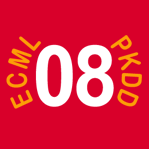Many Web 2.0 applications have rapidly emerged on the Web. This indicates a currently ongoing grass-root creation of knowledge spaces on the
Web. The reason for the success of the upcoming tools for Web cooperation (wikis, blogs, etc.) and resource sharing (social bookmark systems, photo
sharing systems, etc.) lies mainly in the fact that no specific skills are needed for publishing and editing. Web 2.0 applications are a very
interesting application area for data mining. Unlike in traditional data mining scenarios, data does not emerge from a small number of
(heterogeneous) data sources, but virtually from millions of different sources. As there is only minimal coordination, these sources can overlap or
diverge in any possible way. This fundamental structure, known from collaborative filtering, is not limited to ratings and recommendations but can
be applied to arbitrary complex data and data mining tasks. Steps into this new and exciting application area are the analysis of this new data,
then the adaptation of well know data mining and machine learning algorithm and finally the development of new algorithms.
As research analyzing Wikis, Blogs and the structure underlying Social Bookmarks is beginning to mature (as shown in various Web 2.0, Wiki
and Blogs workshops and conferences), this workshop seeks for contributions that make the next step and apply state-of-the-art data mining
algorithm and machine learning methods on Web 2.0 data. Papers describing new algorithms working on Web 2.0 data or work discussing aspects on the
intersection of Web 2.0 and Knowledge Discovery are also highly welcome. In short, we want to accelerate the process of identifying the power of
advanced data mining operating on Web 2.0 data, as well as the process of advancing data mining through lessons learned in analyzing these new
data.
The topics of the workshop include, but are not limited to:
- network analysis of social resources sharing systems
- analysis of wikis and blogs
- analysis of social online communities
- discovering social structures and communities
- analysis of network dynamics
- discovering misuse and fraud
- Web 2.0 personalization
- Web 2.0 technologies for recommender systems
- information retrieval in the Web 2.0
- community detection
- emergent semantics
- Web 2.0 based ontology learning
- predicting trends and user behavior
- semantic association identification by link analysis
- Web 2.0 crawling
- mining information from distributed and re-combined (?mashed-up?) Web 2.0 sources
- mobile Web 2.0: social search; mobile communities; ?
- usage interfaces for mining: parallelization of Web and mobile interfaces; mash-up interfaces; interactions between usage interfaces and
data collection, mining, and presentation
- privacy challenges in Web 2.0 and mobile Web 2.0 applications
- applications of any of the above methods and technologies
Important Dates Google Calendar iCalendar
(iCal/Outlook)
- Paper submission deadline: June 16
- Author Notification: July 16
- Camera Ready Papers: August 7
Submission instructions
We invite two types of submissions for this workshop:
- Technical papers (maximum 12 pages)
- Short position papers (maximum 6 pages)
Submitted papers will be peer-reviewed and selected on the basis of these reviews. Accepted papers will be presented
at the workshop.
All submissions must be entered into the reviewing system Easychair
in Postscript or PDF format. Although not required for the initial submission, we recommend to follow the
format guidelines
of ECML/PKDD (Springer LNCS -- LaTeX Style File), as this will be the required
format for accepted papers.
The workshop proceedings will be distributed during the workshop. We plan to issue a post workshop publication of selected papers by Springer Lecture Notes.
If you have further question please contact one of us or send a mail to:
wbbtmine08@gmail.com
Workshop Chairs
Program Committee
- Sarabjot Singh Anand, University of Warwick, UK
- Mathias Bauer, mineway, Germany
- Janez Brank, Jozef Stefan Institute, Slovenia
- Michelangelo Ceci, University of Bari, Italy
- Ed H. Chi, PARC, USA
- Brian Davison, Lehigh University, USA
- Marco de Gemmis, University of Bari, Italy
- Miha Grcar, Jozef Stefan Institute, Slovenia
- Marko Grobelnik, Jozef Stefan Institute, Slovenia
- Kristina Lerman, USC Information Sciences Institute, USA
- Pasquale Lops, University of Bari, Italy
- Ernestina Menasalvas, Universidad Politecnica de Madrid, Spain
- Dunja Mladenic, Jozef Stefan Institute, Slovenia
- Ion Muslea, SRI International, USA
- Giovanni Semeraro, University of Bari, Italy
- Ian Soboroff, National Institute of Standards and Technology, USA
- Myra Spiliopoulou, Otto-von-Guericke-Universitaet Magdeburg, Germany
- Gerd Stumme, University of Kassel, Germany
- Maarten van Someren, Universiteit van Amsterdam, The Netherlands
- Michael Wurst, University of Dortmund, Germany
Related Events

